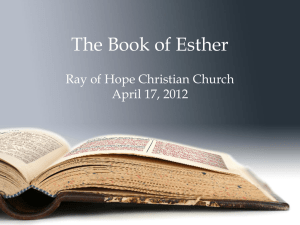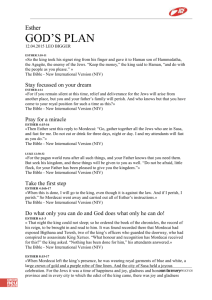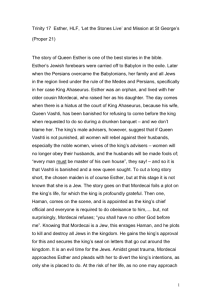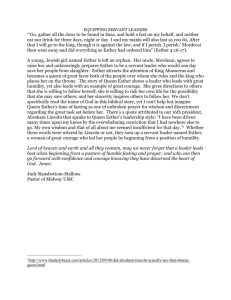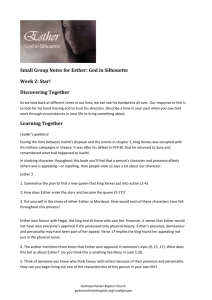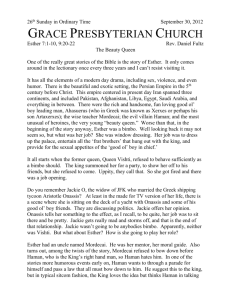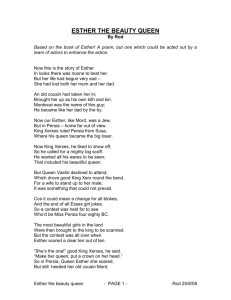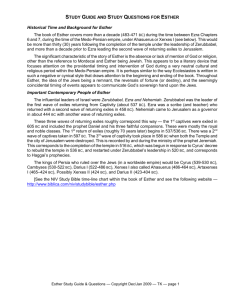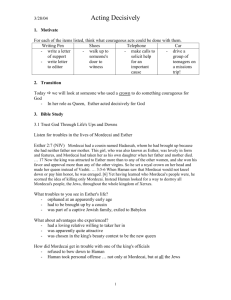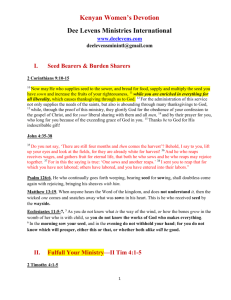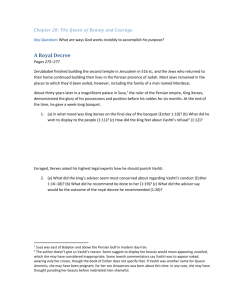Esther: Paragon of Beauty and Virtue
advertisement
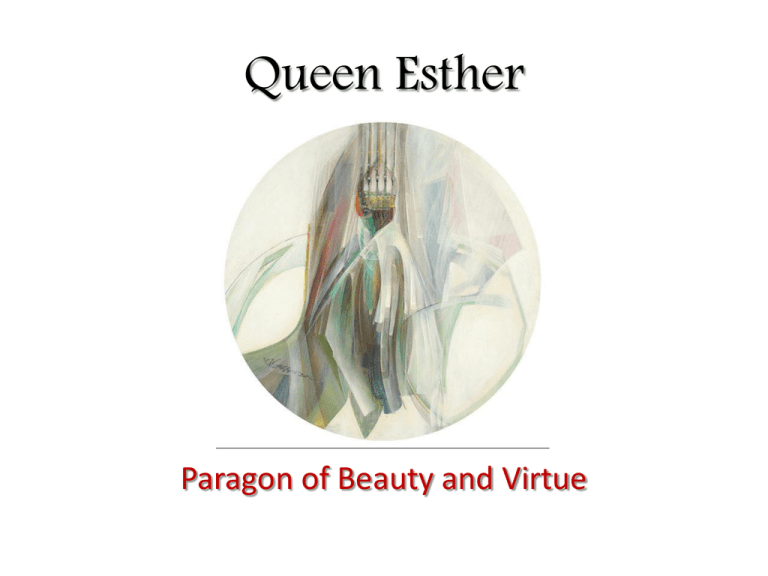
Queen Esther Paragon of Beauty and Virtue The Story of Esther • The expulsion of Vashti (1:1-22) • The elevation of Esther (2:1-23) • The extermination of the Jews (3:1 – 9:32) – The extermination planned (3:1 – 4:17) – The extermination thwarted (5:1 – 9:32) • The exaltation of Mordecai (10:1-3) The Expulsion of Vashti • King Ahasuerus made a great feast (1:1-8) • Queen Vashti was commanded to come and show her beauty, but she refused (1:9-12) • King Ahasuerus accepted the counsel to reject Vashti and look for another queen (1:13-22) The Elevation of Esther • Fair, young virgins were brought to Shushan to be purified for selection (2:1-4) • Hadassah (Esther) was taken in with the other virgins and given special treatment (2:5-11) • Esther obtained favor in the sight of the king and was selected as queen (2:12-18) • Mordecai saved the king’s life (2:19-23) The Extermination of Jews • Mordecai refused to bow down to Haman, so Haman wanted to kill all the Jews (3:1-5) • Haman made request of the king to have the Jews destroyed and the decree was sent out (3:7-15) • The Jews mourned the impending doom and Esther was made aware of the problem (4:1-8) The Extermination of Jews • Mordecai asked one question that instilled courage and virtue in Esther (4:13-17) • Esther requested of the king a banquet with himself and Haman (5:5-8) • Haman showed joy and pride (5:9-14) • Mordecai is recognized for his earlier good deed of saving the king (6:1-14) The Extermination of Jews • Esther exposed Haman’s plan to destroy the Jews and Haman was hanged (7:1-10) • Esther requested of the king that the Jews be authorized to protect themselves (8:1-14) • There was joy and gladness among the Jews (8:15-17) The Extermination of Jews • The Jews resisted and their enemies were destroyed (9:1-16) • The feast of Purim was instituted to celebrate the Jews’ victory (9:17-32) The Exaltation of Mordecai • Mordecai advanced in the kingdom and continued to care for his people (10:1-3) Esther Paragon of Beauty and Virtue • She was lovely and beautiful (2:7) • She was godly and virtuous … – She was a young and chaste virgin (2:2-3) – She was a respectful and obedient daughter (2:7,20; 4:8) – She was a sacrificial and religious Jew (4:15-16) – She was a bold and courageous queen (4:16; 5:4; 7:6; 8:3-6) Esther Paragon of Beauty and Virtue • She was godly and virtuous … – “I am a young person…” – “I was not raised by my parents…” – “I am living far from home in difficult times…” – “I am surrounded by worldliness…” – “I am popular and don’t have time for…” – “I am a victim of prejudice and hatred…” – “I am not going to be affected by…” – “I have to do what __________ says…” Esther Paragon of Beauty and Virtue • Inward beauty is more important than outward beauty (Prov. 31:30) • Clothe your inside with godliness (1 Tim. 2:9-10) • Inward purity must be passed on (Tit. 2:5) • Incorruptible apparel is in the sight of God of great price (1 Pet. 3:4) Esther Paragon of Beauty and Virtue • Think on what is virtuous and you will be virtuous (Phil. 4:8) • Add to your faith, virtue and you will be virtuous (2 Pet. 1:3,5) • Esther had youth, Esther had beauty, but most importantly, Esther had virtue. Be an Esther today!
